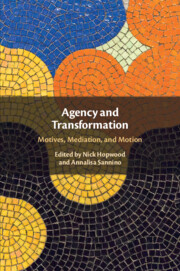Book contents
- Agency and Transformation
- Agency and Transformation
- Copyright page
- Dedication
- Contents
- Figures
- Tables
- Contributors
- Preface
- Acknowledgments
- Chapter 1 Motives, Mediation and Motion
- Chapter 2 Toward a Power-Sensitive Conceptualization of Transformative Agency
- Chapter 3 The Tasks of Reality and Reality As the Task
- Chapter 4 A Relational View of a Future-Orientated Pedagogy
- Chapter 5 From Future Orientation to Future-Making
- Chapter 6 Excluded Lives
- Chapter 7 Children’s and Youth’s Civic Projects and Responsible Agency
- Chapter 8 Decolonizing Agency
- Chapter 9 Unpacking Social Articulation of Agency
- Chapter 10 The Emancipatory Nature of Transformative Agency
- Chapter 11 Choice in Childbirth, Agency and Collective Action
- Chapter 12 Transformative Agency by Double Stimulation in an Ecological Agroforestry Association from Brazil
- Chapter 13 Transformative Agency and the Cultivation of Innovations in Frontline Homelessness Work
- Chapter 14 Children’s Agency during the COVID-19 Pandemic in China
- Chapter 15 Agency As the Direction and Reach of Actions
- Index
- References
Chapter 9 - Unpacking Social Articulation of Agency
Vexed Questions for Responsive Professional Action
Published online by Cambridge University Press: 23 November 2023
- Agency and Transformation
- Agency and Transformation
- Copyright page
- Dedication
- Contents
- Figures
- Tables
- Contributors
- Preface
- Acknowledgments
- Chapter 1 Motives, Mediation and Motion
- Chapter 2 Toward a Power-Sensitive Conceptualization of Transformative Agency
- Chapter 3 The Tasks of Reality and Reality As the Task
- Chapter 4 A Relational View of a Future-Orientated Pedagogy
- Chapter 5 From Future Orientation to Future-Making
- Chapter 6 Excluded Lives
- Chapter 7 Children’s and Youth’s Civic Projects and Responsible Agency
- Chapter 8 Decolonizing Agency
- Chapter 9 Unpacking Social Articulation of Agency
- Chapter 10 The Emancipatory Nature of Transformative Agency
- Chapter 11 Choice in Childbirth, Agency and Collective Action
- Chapter 12 Transformative Agency by Double Stimulation in an Ecological Agroforestry Association from Brazil
- Chapter 13 Transformative Agency and the Cultivation of Innovations in Frontline Homelessness Work
- Chapter 14 Children’s Agency during the COVID-19 Pandemic in China
- Chapter 15 Agency As the Direction and Reach of Actions
- Index
- References
Summary
The concept of ‘agency’ demands theorization that captures the dynamic (in-motion) and collective nature (motive orientation) of practice. This chapter follows Edwards’ conceptualisation of relational agency and Stetsenko’s critique of grand narratives of agency, viewing agency as central to relational and transformative practice. Methodologically, the chapter argues in favour of researching incomplete practices in their making or formation rather than complete, fossilised, best practice examples. Data from the initial teacher education programme and teacher sharing meetings show how motive orientation for transformative and responsive professional action takes shape among teachers. It is argued that agentic action is historical and located in the collective system of practice. The findings of the study also put more weight behind arguments that understanding agentic action demands more interrogation of the ‘why’ and ‘where to’ questions of practice; that is, unpacking the ‘motion’ and ‘motive orientation’ of the practice.
- Type
- Chapter
- Information
- Agency and TransformationMotives, Mediation, and Motion, pp. 209 - 229Publisher: Cambridge University PressPrint publication year: 2023

